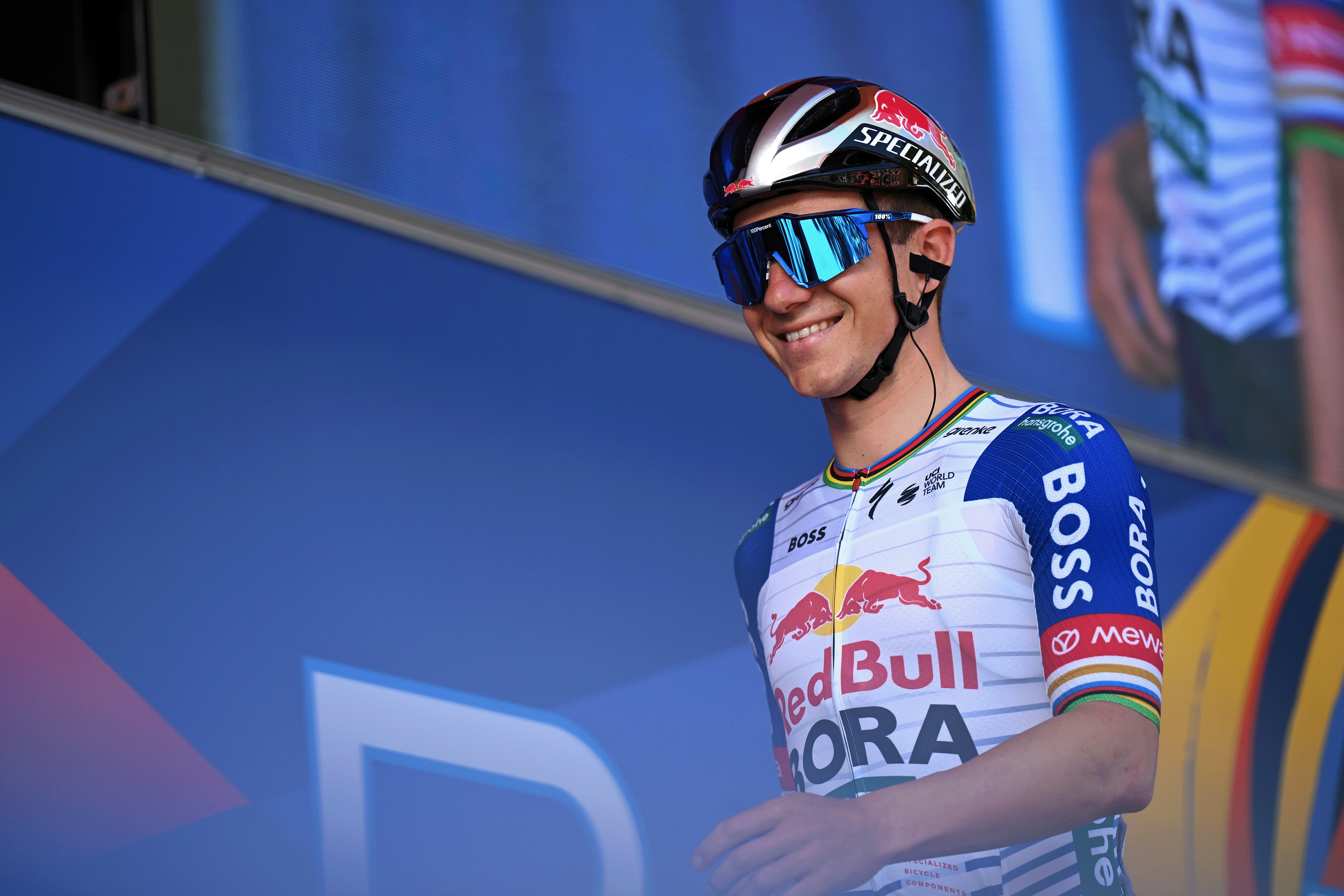Eating disorders, cheating, and the logistics of an in-person event: UCI speaks out ahead of Esports World Championships
MyWhoosh flies 42 competitors to Abu Dhabi for first ever in-person Cycling World Esports World Championships
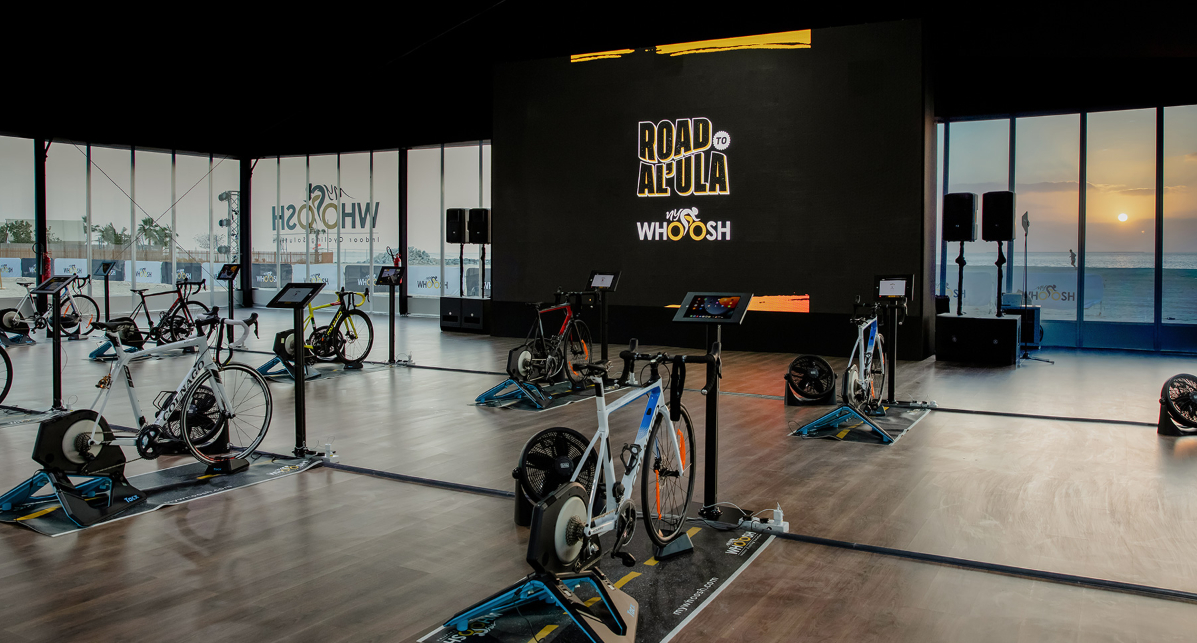
The latest race content, interviews, features, reviews and expert buying guides, direct to your inbox!
You are now subscribed
Your newsletter sign-up was successful
Sitting in a posh hotel restaurant in Abu Dhabi, the UCI's Cycling Esports Coordinator, Jacob Fraser, has a busy schedule this week. He has just five minutes to grab lunch between interviews, on a day that also includes equipment calibration, dress rehearsals, anti-doping test coordination and more.
He's not long arrived in The UAE from his home in Los Angeles, but the inaugural in-person Cycling eSports World Championships are just a day away, and the tall American is at the centre of it all.
He's no stranger to the inner workings of a cycling esport competition though, having worked in the space for the better part of a decade, and cycling indoors for most of his life.
"I've been at the UCI now for nearly two years," he begins. "Prior to joining the UCI, I worked for My Whoosh as the Director of Esports and Events for two years, and before that, I was at Zwift for over four years."
"Like a lot of us in cycling, I fell in love with the sport at a young age when I saw a stage of the Tour de France go whizzing by on family vacation. I pretended to race my bike in my local crit scene and stuff like that. But I grew up in the city of Chicago where weather was never that great, and so I remember the old days of computrainer, and the VHS tapes we all had to watch when you were riding indoors."
He explains that his role within the UCI is broad-ranging, but in something of an oxymoron, quite specific too.
"It covers four areas of esports holistically: We talk about the delivery of the World Championships, we support any inclusion in the Olympic programming, and then we have commercial partnerships across hardware homologation," which essentially ensures any device used in such high-level competition has been checked and calibrated to verify accuracy.
The latest race content, interviews, features, reviews and expert buying guides, direct to your inbox!
"At some point, it will be things like independent performance verification. I've worked with the ITA [International Testing Agency] for events like this. And then lastly is focusing on establishing sanctioned racing and partnership with our commercial partners and our national federation."
This will be the fourth edition of the Cycling Esports World Championships, but the first time it has been held on the UAE-based MyWhoosh platform, which took over from Zwift after a bidding process last year. He says multiple platforms put in a bid, and that several people within the UCI were responsible for the decision.
While the decision to offer a live final was denoted as important, he is keen to stress it's not essential to the success of cycling esports.
"Virtual events will always be very vital to eSports. One of the unique aspects of our discipline is that people can compete at home. Our athletes oftentimes have full-time jobs or families, so being able to not travel is very important to the discipline, and I think one of the more exciting things about esports, is you can race multiple times per week because you don't have to get in the car and go to a race or get on an airplane."
"Everybody who bid talked about a live final. It's just a natural evolution for the sport to go through, but it wasn't a requirement or a prerequisite."
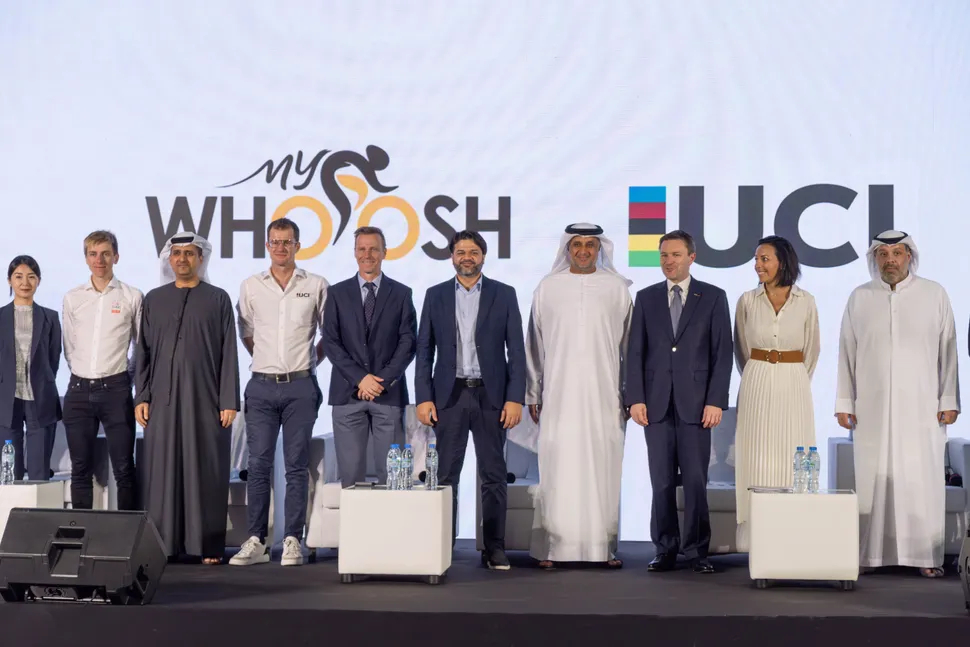
Cheating
Cycling esports, like any sport where competitive advantage can be gained or gamed, has faced cheaters. Days ahead of the 2022 World Championships, an undetectable weight-changing hack was shared online, resulting in Zwift banning the user involved.
The Zwift platform has also banned riders for data manipulation on numerous occasions, and the British cycling esports champion, Cameron Jeffers, was banned in 2019 for using a device that racked up miles and unlocked better in-game equipment ahead of his championship-winning ride.
Fraser, who was at Zwift throughout those early scandals, has surely seen it all but nevertheless remains optimistic about the sport's cleanliness.
"We, as the UCI, are hopeful to help the industry standardise. We're working on trainer homologation as one example, and we're working on sanctioned racing as another from the publisher side. The evolution of the sport to host a live final, where there has been commercial investment, allows us to wrangle the cheating or to look at it from perhaps a slightly more optimistic perspective, the technical issues and accidental cheating.
"To put it in minor terms, when we bring it into a live final, we have fewer variables to contend with, and we have greater influence to solve for those variables. So it's not to say that any previous event with 100 riders at home had any sort of malpractice behind it. It just allows us to evolve the sport even more.
When everyone's in the same room, a lot of questions are answered, and then we as the UCI or My Whoosh can provide things that people can't do at home. A good example is that all esport runs on internet connections. When you're at home, you're beholden to your local WiFi. But here at the venue, we can bring in the local service provider. We can put a much stronger signal, and we can bring redundancies and backups and all those types of things."
However, cheating on the equipment side only covers a portion of the overall opportunity for malicious practice.
"Our partners at the ITA, as an independent organization, are here, and there will be anti-doping controls, as there is for every world championships," Fraser asserts.
"From a technical side, we have our partners with Elite who have undergone more stringent hardware testing than has ever been done for any esports world championship. And then, from an athlete perspective, we maintain control over every piece of equipment that is not their bicycle, but the UCI still inspects their bicycle.
"We're looking for motors in the bikes. We're looking for any other form of mechanical doping, things like that. So there's again a greater oversight, for lack of a better term, on all of the variables that someone could take advantage of if they were malicious."
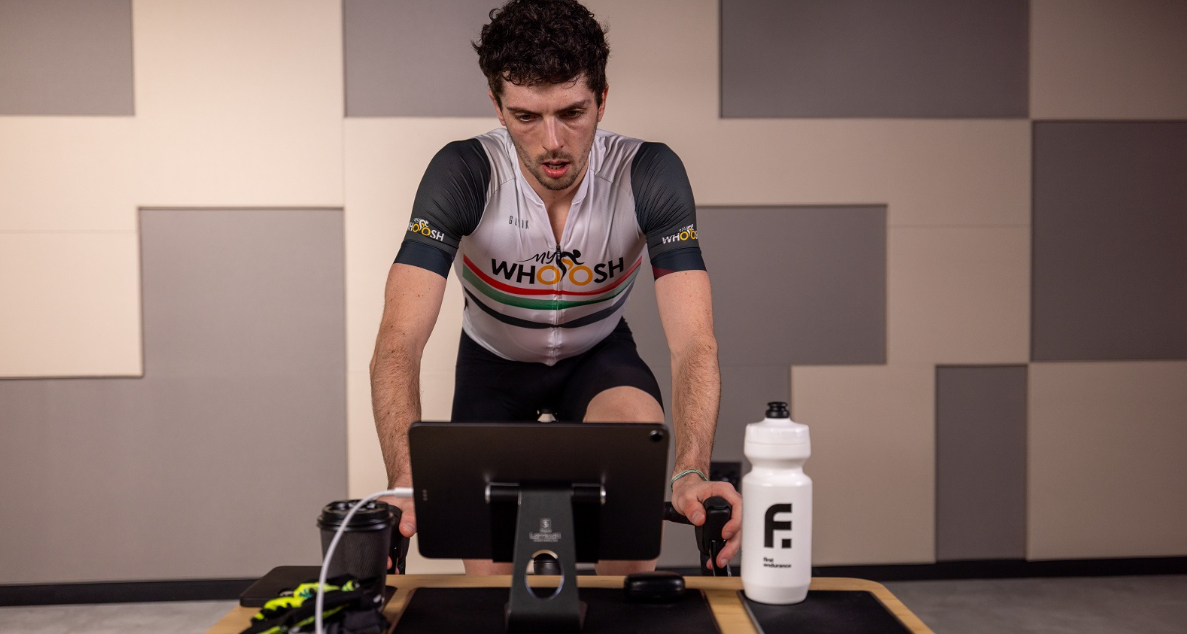
Weight doping and disordered eating
Of course, on all virtual cycling platforms, every cyclist must enter their weight to ensure their avatar responds accordingly to their power. Without it, muscular powerhouses like the WorldTour time triallist Filippo Ganna would win on all terrains, mountainous or otherwise. But to ensure fairness, all riders must undergo an official weigh-in. In virtual events, this requires a longwinded process of videoing yourself on the bathroom scales, while also proving the date and time. In Abu Dhabi, that can be done in person.
At breakfast this morning, I got talking to a couple of the competitors, one of whom had been woken up early by the aforementioned ITA anti-doping testers, and an interesting marginal gain was mentioned.
On the subject of carb loading, it was highlighted that the weigh-in was at 8 AM. For the men, the competition doesn't start until almost 12 hours later. Riders could, in theory, avoid eating and drinking in advance of the weigh-in, then spend the 12-hour window before the race trying to carb load and hydrate.
Fraser explained this is something he wants to mitigate as much as possible, and even drew comparisons with disordered eating.
"This is something we will eventually try and mitigate as best we can." he began. "I think, when it comes to the weigh-in procedure, the unfortunate reality of esports, or virtual cycling holistically, is that the simple maths of propelling an avatar down a virtual road is power and weight how we move forward in the virtual space, so weight will always play an important role.
"There are a lot of ideas in the industry about how to mitigate this weigh-in procedure. It's not anyone's favourite part of cycling esports to have to weigh yourself. We have to validate that weigh-in through video or through an in-person event like we have here this week. And then I think the point is very salient that depending on when you schedule the weigh-in, athletes in every sport on the face of the planet, are always looking for any advantage they can gain when it comes to weight, specifically, and you begin to flirt with a very dangerous concept of disordered eating, or eating disorders, and that's a terrible thing that sport holistically is working itself through.
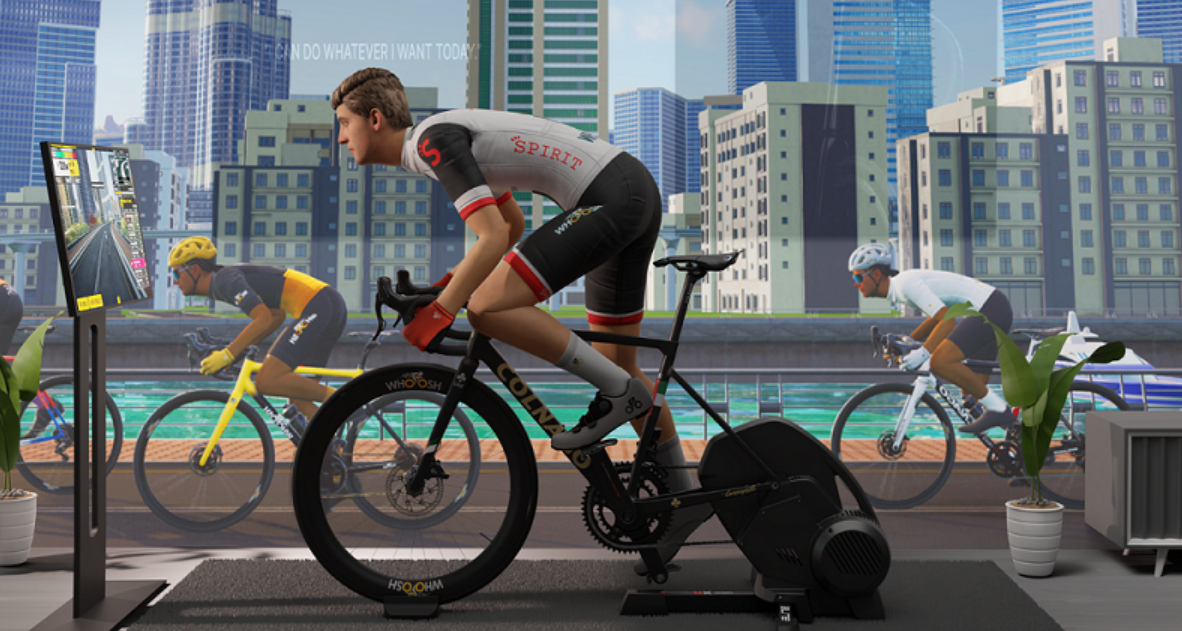
"From a cycling esports perspective, you have two options. You can either bring the weigh-in as far forward as you can, days ahead of the event. That doesn't stop the issue and I would make the argument personally that it would actually go [more] into eating disorder or disordered eating, or you bring the weigh-in as close to the event as possible, so that an athlete who undergoes any extremes like a sauna or not eating, for example, will have a performance struggle as a result of that.
"There are logistical concerns to go through of weighing 40 athletes in and denoting that and getting them started and getting the machine set up. So the decision was taken for this event to bring it into the morning. But because everyone travels here, and because jet lag is what jet lag is, we're hopeful that the impact will be minimal and that the event is quickly thereafter, and so the performance detriment outweighs the risk of doing anything untoward.
"Is that the best decision we had available to us? I think there's an endless amount of ideas on how best to solve that problem long term, but for this event, it's the best decision.
"The long-term health of the athletes is one of the most important aspects of sport in general, so anything an athlete is doing to gain a competitive advantage that may have an untoward impact on the long term health, we've got to do everything we can to stop that."

Josh is Associate Editor of Cyclingnews – leading our content on the best bikes, kit and the latest breaking tech stories from the pro peloton. He has been with us since the summer of 2019 and throughout that time he's covered everything from buyer's guides and deals to the latest tech news and reviews.
On the bike, Josh has been riding and racing for over 15 years. He started out racing cross country in his teens back when 26-inch wheels and triple chainsets were still mainstream, but he found favour in road racing in his early 20s, racing at a local and national level for Somerset-based Team Tor 2000. These days he rides indoors for convenience and fitness, and outdoors for fun on road, gravel, 'cross and cross-country bikes, the latter usually with his two dogs in tow.
